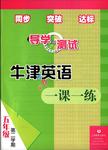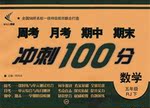题目内容
The lectures, ________ the current international issues, are well received.
- A.cover
- B.covered
- C.covering
- D.to cover

 导学与测试系列答案
导学与测试系列答案 新非凡教辅冲刺100分系列答案
新非凡教辅冲刺100分系列答案The marine environment is fascinating to study and work in due to its beauty, richness, and complexity. It covers three quarters of the surface of the Earth, yet we know more detail about the surface of Mars.
In the past, it was seen as both an inexhaustible resource and a bottomless sink for our wastes. Yet the increasing pressures of overpopulation, pollution and the threat to our natural environment mean that there is an increasing need for scientists who can understand how it all works, how it affects us, and how we are affecting it from global warming through to the smallest plankton.
From local issues to global concerns, we now know that the marine environment is inextricably linked to our lives, and to our future survival. It is an area where much remains to be discovered, and where only a multidisciplinary approach can cover the breadth of issues to be confronted. This is the approach taken on our Marine Environmental Science degree course.
This course takes a multi-disciplinary approach to explore and understand the marine environment. After an initial grounding in basic science, optional choices are available in specialist topics such as marine ecosystems and pollution, coastal navigation and oceanography, among others.
Our new harbor side marine laboratory is used for some of the specialist lectures, laboratory and project work, while a week's residential field course in the Isle of Man provides training to prepare for the research project conducted in your final year. There is an optional trip to Belize in the final year to study tropical marine environments.
【小题1】 From the passage, we can infer that ______.
| A.people waste a lot of resource |
| B.marine environment covers 3/4 of the surface of Mars |
| C.marine environment is beautiful for its sufficient resources |
| D.the Earth is similar to Mars |
| A.the relationship between people’s actions and natural environment |
| B.the relationship between people’s actions and pollution |
| C.the relationship between people’s actions and overpopulation |
| D.the relationship between people’s actions and plankton |
| A.we can choose some issues as optionally as we can |
| B.we have practiced the approach for a long time |
| C.the approach is linked to our future survival |
| D.the approach covers a lot of problems we will meet |
| A.1 | B.2 | C.3 | D.4 |
A. make lectures about the issues to be confronted
B. provide training to get ready to do research project
C. take several days residential field in the Isle
travel to Belize to study tropical marine environments
Answers:
Basic Math introduces students to the basic things of mathematics, as well as some easy methods of learning it. These 30 fantastic courses are designed to provide students with understanding of arithmetic and to prepare them for Algebra (代数) and beyond.
The lessons in Basic Math cover every basic field of arithmetic. They also look into exponents (指数), the order of operations, and square roots. In addition to that, students also discover how a particular mathematical topic relates to other branches , and how they can be used practically.
Basic Math starts from easier concepts and gradually moves on to the more troublesome ones. The lectures offer students the chance to understand of mathematical knowledge that may have seemed so frightening. They also help students prepare for college mathematics and develop confidence in this amazing field of study.
With the help of these lectures, they will be able to clear away the mystery (神秘性) of mathematics and face their studies with more confidence than they ever imagined. Besides, they will strengthen their ability to accept new and exciting mathematical challenges.
Professor H. Siegel, honored by Kentucky Educational Television as "the best math teacher in America, " is a devoted teacher and has a gift for explaining mathematical concepts in clear and interesting ways. From the basic ideas to the more difficult problems, he is a master in making math lectures learner-friendlier and less frightening
With a PhD in Mathematics Education form Georgia State University, Dr. Siegel now teaches mathematics at Central Arizona College.
If the course fails to provide complete satisfaction to you, you can easily exchange it for any other course that we offer. Or you can get your money back.
1.What does the course Basic Math mainly cover?
|
A.Algebra |
B.College Mathematics |
|
C.Arithmetic |
D.Mathematics Education |
2. What good things can students expect from Basic Math?
|
A.Stronger imagination ability. |
|
B.Additional presentation skills. |
|
C.More mathematical confidence. |
|
D.Greater chances of becoming teachers. |
3.What can we learn about Professor H. Siegel?
|
A.He is a lecturer at Kentucky Educational Television. |
|
B.He is delivering 30 lectures in Basic Math. |
|
C.He works in Georgia State University. |
|
D.He specializes in training teachers. |
4.Where is the passage most likely to have been taken from?
|
A.news report |
B.A book review |
|
C.A lesson plan |
D.An advertisement |